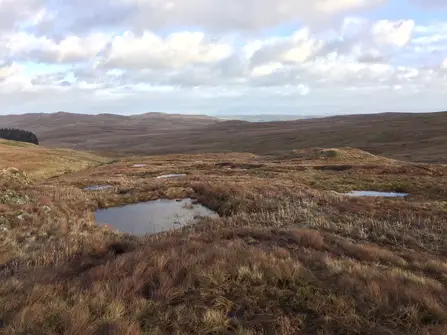A new survey shows that only one of 20 leading garden retailers contacted by The Wildlife Trusts reported that it would eliminate peat from its shelves this year – and the survey reveals an overall lack of ambition by retailers to set targets to end peat sales. Last year, the voluntary target set by the Government to end sales of peat composts to amateur gardeners was missed.
This year the Government will decide if new legislation is needed to end peat use in the horticultural sector – but there is still no sign of their long-awaited peat strategy.
The Wildlife Trusts are now calling for an immediate end to sales of peat compost – further delay will cause continued destruction of peatlands worldwide.
Some retailers are doing notably better in moving away from peat than others: of the 11 out of 20 retailers that responded to the survey, all now offer peat-free composts as part of their range, and none sell soil improvers or mulch containing peat. Travis Perkins and Wickes were the only two retailers to declare an end-date for peat sales – Travis Perkins by this year, and Wickes by 2025. But while a further few plan to end peat sales in the future, no dates have been specified and others have no clear commitments at all. Just four reported stocking ranges of peat-free plants.
Craig Bennett, chief executive of The Wildlife Trusts says:
“Our survey shows that most retailers’ approach to the voluntary ban on peat sales has been woeful – even though the industry has been aware of the problem for decades. The time for voluntary agreements is over – the sale of peat must end now. Countless promises have been broken, and targets missed with the result that precious peatland habitats are still being unnecessarily destroyed in the name of gardening.
“Peatlands are vital wildlife habitats and it’s absolutely crucial that they remain intact to help us tackle climate change. The Government can ensure that these important carbon stores function as nature intended by banning peat sales now.
“Only one leading retailer – Travis Perkins – is planning to eliminate peat from its shelves by 2021, whilst growers like Hillier demonstrate that you can produce compost and grow high-quality plants without peat. These retailers are to be congratulated, but we now need Government to make the rest follow their lead. The time for delay and excuses is over.”
Ten years ago, the Government set a voluntary target for the horticulture sector to end sales to gardeners by 2020 and to end professional use of peat, for example, in plant growing, by 2030. As this approach has failed, The Wildlife Trusts now believe that retailers should end consumer peat compost sales immediately and the target for professional growers should be brought forward to 2025. Monitoring showed that in 2019, peat still made up over 40% by volume of the growing media sold in the retail sector despite the 2020 target, whilst total peat use in horticulture (retail, professional and export) stood at over 2 million cubic metres.
Investment in alternatives is required to help retailers move away from peat, and a ‘Responsible Sourcing Scheme’ has been established to ensure that alternatives don’t come with their own eco-problems. Peat-free composts are now more widely available than ever and many give excellent results, with good advice also available on making your own compost at home. This means that although peat extraction is by no means the only cause of damage to our peatlands, it is one of the easiest to prevent.







